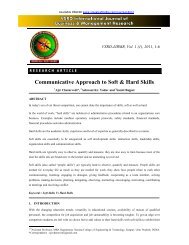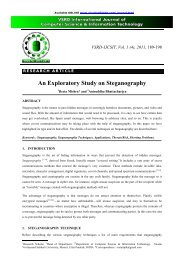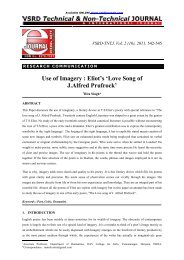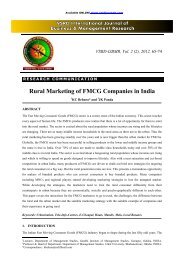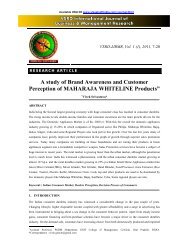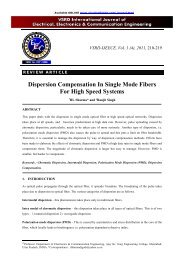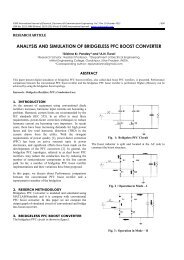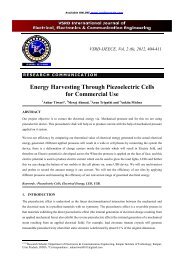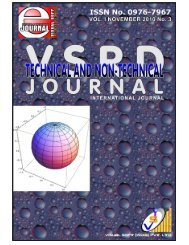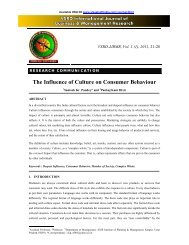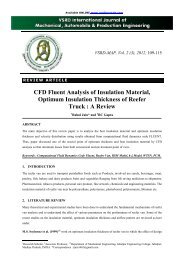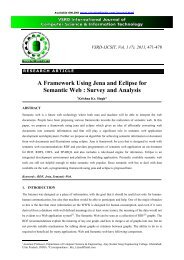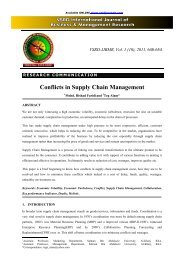Money : Does It Really Affect Hotel Employee's Performance As A ...
Money : Does It Really Affect Hotel Employee's Performance As A ...
Money : Does It Really Affect Hotel Employee's Performance As A ...
Create successful ePaper yourself
Turn your PDF publications into a flip-book with our unique Google optimized e-Paper software.
Available ONLINE www.vsrdjournals.com<br />
R E S E A R C H C O M M U N II C A T II O N<br />
____________________________<br />
VSRD-IJBMR, Vol. 2 (2), 2012, 38-46<br />
<strong>Money</strong> : <strong>Does</strong> <strong>It</strong> <strong>Really</strong> <strong>Affect</strong> <strong>Hotel</strong> Employee’s<br />
<strong>Performance</strong> <strong>As</strong> A Motivational Factor !!!<br />
ABSTRACT<br />
1 Sunil Panwar* and 2 Nitin Gupta<br />
<strong>Money</strong> is the most obvious Motivational factor for starting level hotel employees, whether it is in the form of<br />
pay or some other kind of remuneration. Everyone wants to earn fair wages and salaries, and every employer<br />
wants their employees to feel that he is the best paymaster. Thus it can be said that employees and employers<br />
view money as the basic factor for job satisfaction. Employees can have different motivational factors; only<br />
money cannot motivate an employee to change his job or only money cannot give proper job satisfaction to the<br />
employees. In case of hotel employees’ hotel associates want more tangible rewards while the managers want<br />
job security, recognition by management and time for their family. Thus <strong>Money</strong> may or may not motivate<br />
people. <strong>Money</strong> serves as a highly tangible means of recognition. Though there are many reasons why people<br />
work for a living, it cannot deny that money, or other financial rewards, play a key role in motivating people in<br />
the workplace.<br />
Keywords : Financial Rewards, <strong>Hotel</strong>, Job Satisfaction, <strong>Money</strong>, Motivational Factors, Remuneration.<br />
1. INTRODUCTION<br />
The hotel industry is a significant part of the tourism industry world wide and its employees play a key role in<br />
delivering the service to customers. The motivation of employees, whether professional, skilled or unskilled, is a<br />
major issue in all service organizations. For the hotel industry, employee motivation is a major issue. <strong>It</strong> is a<br />
challenge for the hotel industry to motivate employees, to stay on the job, and to offer the efficient, good service<br />
which customers expect. The purpose of this study was to assess the role of money as a motivational factor for<br />
hotel employees.<br />
1 <strong>As</strong>sistant Professor, Department of <strong>Hotel</strong> Management, Swami Vivekananda Subharti Institute of <strong>Hotel</strong> Management,<br />
Meerut, Uttar Pradesh, INDIA. 2 Research Scholar (Management), Mewar University, Chittorgarh, Rajasthan, INDIA.<br />
*Correspondence: sunil1982.hotelier@gmail.com
Sunil Panwar et. al / VSRD International Journal of Business & Management Research Vol. 2 (2), 2012<br />
2. LITERATURE REVIEW<br />
2.1. Motivation<br />
Motivation in simple terms may be understood as the set of forces that cause people to behave in certain ways.<br />
Many people know motivation as the driving force behind an action. This may be the simplest definition of<br />
motivation. Motivation can be considered the state of having encouragement to do something.<br />
In any organization a motivated employee generally is more quality oriented. Highly motivated employees are<br />
more productive. Motivated employees are needed in our rapidly changing workplaces. Motivated employees<br />
help organizations to survive. To be effective, management need to understand what motivates employees<br />
within the context of the roles they perform. For the hotel industry, employee motivation is a major issue. <strong>It</strong> is a<br />
challenge for the management of the hotel industry to motivate employees, to stay on the job and to offer the<br />
efficient, good service which customers expect (Cheng, 1995).<br />
2.2. Motivation Theories<br />
Five major approaches of motivation are Maslow's need-hierarchy theory, Herzberg's two- factor theory,<br />
Vroom's expectancy theory, Adams' equity theory, and Skinner's reinforcement theory.<br />
According to Maslow, employees have five levels of needs (Maslow, 1943): physiological, safety, social, ego,<br />
and self- actualizing. Maslow argued that lower level needs had to be satisfied before the next higher level need<br />
would motivate employees.<br />
Herzberg's categorized motivation into two factors: motivators and hygiene (Herzberg, Mausner, & Snyderman,<br />
1959). Motivator or intrinsic factors, such as achievement and recognition, produce job satisfaction. Hygiene or<br />
extrinsic factors, such as pay and job security, produce job dissatisfaction.<br />
Vroom's theory is based on the belief that employees efforts will lead to performance and performance will lead<br />
to rewards (Vroom, 1964). Rewards may be either positive or negative. The more positive the reward the more<br />
likely the employee will be highly motivated. Conversely, the more negative the reward the less likely the<br />
employee will be motivated.<br />
Adams' theory states that employees struggle for equity between themselves and other employees. Equity is<br />
achieved when the ratio of employee outcomes over inputs is equal to other employee outcomes over inputs<br />
(Adams, 1965).<br />
Skinner's theory simply states those employees' behaviors that lead to positive outcomes will be repeated and<br />
behaviors that lead to negative outcomes will not be repeated (Skinner, 1953). Management should positively<br />
reinforce employee behaviors that lead to positive outcomes. Management should negatively reinforce employee<br />
behavior that leads to negative outcomes.<br />
2.3. Importance of Motivation<br />
Motivation is required for the organizations, because:<br />
Page 39 of 46
Sunil Panwar et. al / VSRD International Journal of Business & Management Research Vol. 2 (2), 2012<br />
� Motivated employees are always looking for better ways to do a job.<br />
� A motivated employee generally is more quality oriented. This is true whether we are talking about a<br />
manager spending extra time in handling a restaurant or hotel or an associate taking extra care when<br />
arranging a function.<br />
� Highly motivated worker are more productive than apathetic worker.<br />
� Main purpose of motivation is to attract employees not only to join the organizations but also to remain in<br />
it.<br />
� Motivated employees perform the tasks in a dependable manner.<br />
3. SOME OF THE MOTIVATIONAL FACTORS FOR HOTEL EMPLOYEES<br />
There are many motivational factors which can be used or are using to motivate the employees:<br />
3.1. Communication<br />
Within a hotel organization, communication is utmost important for passing information from one individual or<br />
group to another. <strong>It</strong> can be in different ways such as verbal, nonverbal, upward, and downward. Lack of good<br />
communication causes low productivity, poor service, and increased costs (Drummond, 1990).<br />
Communication is one of many factors to motivate employees into a cohesive working module which results in<br />
objectives being achieved (Morgan, 1990).<br />
3.2. Training<br />
Powers and Barrows (1999) noted how training becomes an important activity for any hotel organization.<br />
Training provides on-the-job experiences and information that help employees become more proficient or<br />
qualified at a task at their current jobs. A well trained employee results in a reduction of costs, stress, turnover,<br />
and absenteeism and a corresponding increase in efficiency and customer satisfaction (Mill, 1998). Steven<br />
Hickey, senior vice president of T.G.I Friday’s, noted “training is probably the most important aspect of reduced<br />
turnover because it minimizes mistakes and that minimizes a lot of reasons for turnover” (Powers and Barrows,<br />
1999).<br />
3.3. Wages and Salaries<br />
Salaries are the most obvious motivational factor when it comes to our jobs. Employees constantly compete for<br />
positions that offer the quickest, most easily accessible reward. Sometimes, many other motivational factors<br />
may sacrificed by employees to attain job satisfaction. That is why whenever any associate got good pay in<br />
another hotel or another service sector he moves.<br />
Pay, is a major consideration in human resource management because it provides employees with a tangible<br />
reward for their services (Bohlander, Snell, and Sherman, 2001). Stone (1982) indicated that people are<br />
Page 40 of 46
Sunil Panwar et. al / VSRD International Journal of Business & Management Research Vol. 2 (2), 2012<br />
motivated by money for many different reasons. The need to fulfill the basic necessities of life motivates most<br />
people. Some people think of money as instrumental motivational factor, to satisfying non economic needs such<br />
as power, status and affiliations with desired groups. <strong>Money</strong> is often viewed as a symbol of personal success and<br />
achievement.<br />
3.4. Fringe Benefits<br />
Fringe benefits are additional to wages of workplace compensation. The fringe benefits for the workers in hotel<br />
organizations help the operation by having a positive, motivating work climate, increases in productivity, sales,<br />
profitability, excellent quality and cost control.<br />
<strong>Money</strong> is an important factor to motivate employees but today, fringe benefits become equal to money as an<br />
important role to motivate employees. Following are the different fringe benefits given in hotel organization to<br />
its employees:<br />
1. Health insurance: Health insurance is the most common benefit in the hotel industry.<br />
2. Leave Travel Allowances: Mostly <strong>Hotel</strong> organization provide LTA (Leave Travel Allowances) to its<br />
employees, in which they are given vacations with pay and some extra amount in the form of travel allowance.<br />
<strong>It</strong> is generally agreed that vacations are essential to the well being of an employee. This benefit also favors<br />
employees who need extra time to care for their aging parents or those simply wishing to spend their time with<br />
their family.<br />
3. Meals: In many hospitality operations, employees receive one free meal per daily shift and an unlimited<br />
amount of coffee and soft drinks. At Subway, for example, employees can eat for free in the company’s<br />
cafeteria; most hotels also serve meals in the employees’ cafeteria and do not permit employees to use food and<br />
beverage outlets at their place of employment (Jerris, 1999).<br />
4. Uniform: Every hotel organization provides two set of uniform, which are laundered in hotel itself and<br />
provide to employees on rotation basis, i.e. washed against soiled uniform.<br />
3.5. Good Working Environment<br />
Wheelhouse (1989) noted that the working environment can often be a cause of low productivity. Employees<br />
need adequate equipment, space, heating, lighting and ventilation. Color also has a significant impact on the<br />
work environment. Restrooms and lockers need to be clean, secure, and well maintained. The food provided<br />
should be the same for line employees as for the managers. Managers, including top executives, should be<br />
expected to eat at the cafeteria except when entertaining. If it’s not good enough for managers, it should be<br />
consider not good enough for line employees. Therefore, Cheng (1995) noted that a good working environment<br />
means employees want the same conditions in their work as similar to the management. They need challenge,<br />
support from superiors, a quality workplace, friendly co-workers and respect. To have a good working<br />
environment, management has to trust and value to its employees.<br />
Page 41 of 46
Sunil Panwar et. al / VSRD International Journal of Business & Management Research Vol. 2 (2), 2012<br />
4. MONEY AND MOTIVATION<br />
<strong>Money</strong> is the most obvious extrinsic reward. <strong>Money</strong> acquires significant motivating power because it comes to<br />
symbolize so many intangible goals. <strong>It</strong> acts as a symbol in different ways for different people and for the same<br />
persons at different times. <strong>Money</strong> can provide positive motivation in the right circumstance, not only because<br />
people need and want money but also because it serves as a highly tangible means of recognition. <strong>Money</strong> can be<br />
considered as "scorecard" through which employees can evaluate how much an organization values them.<br />
Kochan (2002) argued that money works as a short-term motivation factor and it does not transform employee<br />
attitude and behavior in the long term. He pointed out that money only motivates employees to seek further<br />
rewards.<br />
Another researcher in this area was Jaques (1961), who emphasized the need for reward systems to be fair and<br />
equitable. <strong>As</strong> per him, the reward should be clearly related to effort or level of responsibility and people should<br />
not receive less money than they deserve compared with their fellow workers. Jaques called this the ‘Felt-Fair’<br />
principle. <strong>It</strong> is necessary to examine the motivational power of money in order to be able to assess the value and<br />
importance of other motivators. <strong>Money</strong> is the means by which employees are directly rewarded for their<br />
contributions towards the achievements of organizational goals.<br />
<strong>As</strong> per the Maslow's hierarchy of needs theory, money is associated with the lower level needs, such as physical<br />
and security needs. Maslow (1954) stated that once the lower-order needs are met, higher-order needs will<br />
become most important. Thus, additional salary increases do not motivate employees any further. To improve<br />
job satisfaction and performance level of employees, management must work on motivational factors by<br />
providing opportunities for career advancement and development, as employees value motivators more than<br />
hygiene factors (Ramlall, 2004).<br />
According to Chester Barnard, money is the weakest motivator an organization could offer its members.<br />
Herzberg totally rejects money as a motivator. <strong>Money</strong> however can be measured while other motivational<br />
factors cannot.<br />
“<strong>Money</strong> does not motivate employees”, this is often a very controversial statement with employees. Employees<br />
want to believe that they are motivated by money, and want their boss and employer to believe that they are<br />
indeed motivated by money (for fear that salaries and / or bonuses will be reduced). Most employees, of course<br />
would never openly admit that money does not motivate them. But when asked few hotel employees that if any<br />
organization offers them the higher position but at the same salary, most of the hotel employees accept to join it<br />
for the sake of their social status. <strong>It</strong> shows that money does not work as a motivator always.<br />
Some people, in select industries such as commission-based sales, might be highly motivated by money. And in<br />
some tip dependent occupations (wait staff, door men, etc.), where the connection to behavior and reward is<br />
almost immediate, pay can also be a motivator. However, these are the exceptions and not the norm.<br />
Opsah and Dunnettee (1966) list five theories of explanations of the role of money in employee motivation and<br />
performance.<br />
� <strong>It</strong> is generally believed that money acts a generalized conditioned reinforcer since it is repeatedly paired<br />
Page 42 of 46
Sunil Panwar et. al / VSRD International Journal of Business & Management Research Vol. 2 (2), 2012<br />
with primary reinforces.<br />
� Some suggest that money is conditioned incentive, that is, the repeated pairing of money with primary<br />
incentives helps to establish a new learned drive for money.<br />
� <strong>It</strong> is suggested that people learn to become anxious in the presence of a variety of cues that signify an<br />
absence of money. Such cues include being told, “That costs too much money” or “We can’t afford that”<br />
Such cues lead to feeling of anxiety (and perhaps feeling of insecurity) which money can satisfy.<br />
� <strong>Money</strong> is seen as “hygiene” factor as in Herzberg’s two-factor theory. In this model, it is suggested that the<br />
absence of money causes dissatisfaction, although the presence of money does not satisfy. <strong>It</strong> merely<br />
eliminates the source of dissatisfaction and brings someone to a neutral state of satisfaction.<br />
� <strong>Money</strong> can serve, as an instrument for gaining other desired outcomes such as building or buying a new<br />
house, car or vacation. These accords with the expectancy/valence theory. Here money acquires value for<br />
an individual to the extent that it can help to fulfill these other desires and needs.<br />
<strong>Money</strong>, for example, could therefore be an instrumental reward for someone wanting a new car but may not be<br />
either an instrumental reward or a motivator for someone seeking escape from the pressures of a routine, dead-<br />
end job. For such a person only job enrichment can motivate.<br />
<strong>Money</strong> could be a motivating factor but within some limited situation. However, we argue that employees take<br />
money for granted as a reward for their labour and it is not seen as a motivator as such. <strong>It</strong>s absence breed’s<br />
dissatisfaction, its presence however does not add to performance over and above the normal.<br />
Research suggests that, as employee’s income increases, money becomes less of a motivator (Kovach, 1987).<br />
Also, as employees get older, interesting work becomes more of a motivator.<br />
5. SURVEY FINDINGS<br />
When a telephonic and online survey done of hotel employees, employees reported that the three things which<br />
motivate them the most:<br />
(1) Good wages, (2) Job security, and (3) Opportunities for advancement and development.<br />
There were differences among the hotel workers, however, based on their age and the area in which they<br />
worked. While mostly employees ranked good wages as the most important job factor, few employees reported<br />
opportunities for development and interesting work as the second and third most-wanted job factors. In contrast,<br />
employees over 30 reported job security and working conditions as the second and third most-important job<br />
factors.<br />
This survey found that the best motivation factor for employees was “Salary”. According to a literature review,<br />
Daschler and Ninemeier (1989) discussed in the strategies to employees’ motivation that “Each person is the<br />
center of his own concern; however, the primary interest is to satisfy needs, ambitions, desires, and goals” and<br />
“An employee wants to satisfy basic needs”. So the reviews of strategies of employees’ motivation that Daschler<br />
Page 43 of 46
Sunil Panwar et. al / VSRD International Journal of Business & Management Research Vol. 2 (2), 2012<br />
and Ninemeier said are true because salary is the basic need for the employees as per the survey.<br />
When we surveyed in Delhi- NCR region hotels more than 40 % employees said that they need good salary<br />
package and for that they always keep an eyes on good hotel’s vacancies. <strong>It</strong> means they are not happy with their<br />
current pay package and that is the reason they are not satisfied with their job. Thus, it can be said money is<br />
related to job satisfaction.<br />
Few employees said that they have to work for long hours in hotel organizations, so they are looking a job in<br />
another service sectors, where they will have to work for 9-10 hours, e.g. BPO’s, event management companies<br />
etc. Few of them said if the hotel organizations increase their pay structures, the employees turn over rate will<br />
decrease and the level of job satisfaction will increase up to a certain level.<br />
Thus, the human resource director should be concerned about higher pay as his first consideration.<br />
Wheelhouse (1989) said that the basic objectives of the wage and salary program are to help the company<br />
attract and keep qualified people, provide equal pay for equal work, reward good performance, control labor<br />
costs, and maintain cost equality with direct competitors.<br />
The second motivational factor was “Job security”. So, Maslow’s theory can illustrate the motivational factors<br />
of the <strong>Hotel</strong> employee because the first factor the employee chose was money, and job security was the second<br />
factor. Furthermore, the investigation of Daschler and Ninemeier (1989) about strategies for employees’<br />
motivation found that most employees want appropriate job security assurance. Thus, the most important factor<br />
for them is job security.<br />
And the third one was “Interesting Job”. Interesting job is one of the motivation factors that can reduce turnover<br />
rate and absenteeism rate in every organization. Moreover, the investigation of Daschler and Ninemeier (1989)<br />
of strategies to improve employees’ motivation found that other factors that can fulfill and motivate employees<br />
are challenging work, work that yields a sense of personal accomplishment, increased responsibility and the<br />
chance to grow in the job. And some more factors that employees need are job rotation, job enlargement and job<br />
enrichment. Jerald and Robert (1997) reviewed Frederick W. Taylor’s book treating people like machines often<br />
meant having them engage in repetitive movements which they found highly routine and monotonous. Then<br />
people became bored with such jobs and frequently quit.<br />
From these results, the motivation factors of employees in the <strong>Hotel</strong> are the same as the study of Charles and<br />
Marshall (1992) in a Las Vegas: that good pay and job security are the first motivation factors of concern to<br />
employees. Similarly with the study of Simons and Enz (1995), the study of 278 hotel employees from 12<br />
different hotels located through United States and Canada found that those hospitality employees preferred (1)<br />
good wages, and (2) job security. Additionally, the results of the study of Dr. Kovach found that good wages<br />
always ranked about the first through the fifth on the list of ten items. Siu, Tsang and Wong (1997) found that<br />
1,245 employees in Hong Kong’s hotel considered opportunities for advancement and development to be the<br />
first important factor and loyalty to employees to be the second factor.<br />
Therefore, hotel organizations should improve motivational factors as their employees require different<br />
factors because they come from different backgrounds. <strong>As</strong> Daschler and Ninemeier mentioned in the<br />
Page 44 of 46
Sunil Panwar et. al / VSRD International Journal of Business & Management Research Vol. 2 (2), 2012<br />
strategies to employees’ motivation, employees are individuals. Everybody comes from a different<br />
background, experience, education and family so they need different things. Human resources can adjust to<br />
the appropriate way. Motivational factors can vary in each hotel and each period. Human resources<br />
department should evaluate the employees’ needs every year.<br />
“HVS has also completed proprietary research on the effectiveness of pay-for-performance metrics in the hotel,<br />
gaming and restaurant industries, and its results generally reinforce the findings of researchers like Gupta and<br />
Perry. That is, “money ranks below other factors relative to job satisfaction, but high on the motivational matrix<br />
when all other factors have been met.” But as per our survey we can say that money motivates every employee<br />
somehow, whether it is alone in combination of other motivational factors.<br />
<strong>As</strong> per Mr. Nitin Tyagi (Management Trainee in a Resort, Ooty), if he got a job in NCR region at the higher<br />
salary he will love to join. He also mentioned that if in NCR region he got the lower designation with higher<br />
salary, he will leave this resort job from this place, while one of his friend in the same resort Mr. Shiv Karan<br />
said that he is happy with the resort environment and he feels safe in this company & satisfied with his job<br />
specification, so he will spend more time in the organization to get promotion and increments. When we spoke<br />
to one another management trainee he told that he is getting highest stipend in his group and he is very much<br />
satisfied with his job, but if he will get offer from another hotel with the higher salary he may be move. <strong>It</strong> seems<br />
if the employees will get good salary, they feel satisfied with their job.<br />
6. CONCLUSION<br />
Each person has his or her own likes and dislikes, passions, interests and desires. <strong>As</strong> indicated in most of the<br />
literature, salary plays an important role in motivating hotel employees. However, the strength of the<br />
relationship between salary and job satisfaction may be influenced by another factors. Someone who values<br />
money highly will be satisfied with his salary and ultimately his job when he receives a desired raise.<br />
According to Lawler (1973), employees' pay satisfaction usually influences their job satisfaction. Tang et al.<br />
(2004) found that pay satisfaction is a part of job satisfaction, which could lead to higher worker productivity.<br />
Workers are inspired to achieve more and to give full effort only if they are satisfied with their pay. <strong>It</strong> is no<br />
surprise that money is an important factor, but there are many other reasons for an employee’s decision to leave.<br />
Lawler (1973) reported that absenteeism can result when pay dissatisfaction is present. According to Mani<br />
(2002), workers who were absent from their works frequently were not satisfied with their job, whereas 69%<br />
who were absent once or more in six months were not satisfied with their pay.<br />
In order to find and retain the right people for the job, hotel organizations in India need to redesign their reward<br />
and recognition packages according to the local culture. Each organization has to build its own motivation<br />
system based on compatibility between organizational and individual goals.<br />
7. REFERENCES<br />
7.1. Books, Journals and Articles<br />
[1] Cheng, H., <strong>As</strong>sessing the Importance of Employee Motivation in the <strong>Hotel</strong> Industry in Taipei, Taiwan.<br />
Page 45 of 46
Sunil Panwar et. al / VSRD International Journal of Business & Management Research Vol. 2 (2), 2012<br />
Unpublished master’s thesis, University of Wisconsin-Stout, Menomonie, Wisconsin, United States (1995).<br />
[2] Daan van Knippenberg, "Applied Psychology;'" Work Motivation and <strong>Performance</strong>: A Social Identity<br />
Perspective; July 2000<br />
[3] Heneman, R. L. Merit pay: linking pay increases to performance Ratings. New York: Addison-Wesley.<br />
(1992).<br />
[4] Industry. East Lansing, MI: Educational Institute American <strong>Hotel</strong> & Motel <strong>As</strong>sociation<br />
[5] James L. Perry, Debra Mesch, and Laurie Paarlberg; "Public Administration Review;" Motivating<br />
Employees in a New Governance Era: The <strong>Performance</strong> Paradigm Revisited; July 2006<br />
[6] Jerald, G. and Robert, A. B., Behavior in Organizations: Understanding and Managing the Human Side of<br />
Work, Upper Saddle River, NJ: Prentice-Hall, Inc. (1997).<br />
[7] Jerris, A. L. Human Resource Management for Hospitality. Upper Saddle River, NJ: Prentice-Hall, Inc.<br />
(1999).<br />
[8] Milkovich, G. T., & Wigdor, A. K. (Eds), Pay for performance: evaluating performance appraisal and merit<br />
pay. Washington, DC: National Academy Press. (1991).<br />
[9] Perry, J. L., Mesch, D., & Paarlberg, L. (2006). Motivating employees in a new governance era: The<br />
performance paradigm revisited. Public Administration Review, 66, 505-514.<br />
[10] Pooja Garg and Renu Rastogi, "Journal of Management Development;" New Model of Job Design:<br />
Motivating Employees' <strong>Performance</strong>; September 2005<br />
[11] Simons, T. and Enz, C., Motivating <strong>Hotel</strong> Employees. Cornell <strong>Hotel</strong> and Restaurant administration<br />
Quarterly, 36 (1), 20-27 (1995).<br />
[12] Tony Simons (Cornell's School of <strong>Hotel</strong> Administration), Cathy A. Enz Motivating <strong>Hotel</strong> Employees<br />
Beyond the Carrot and the Stick<br />
[13] Wheelhouse, D. (1989). Managing Human Resources in the Hospitality<br />
7.2. Websites<br />
[14] http://www.2020skills.com/asts/<strong>Money</strong>%20and%20Employee%20Motivation.pdf<br />
[15] http://www.aspanet.org/scriptcontent/custom/staticcontent/t2pdownloads/Perry Article.pdf)<br />
[16] http://www.ehow.com, How <strong>Does</strong> Motivation Influence Employee <strong>Performance</strong>?<br />
[17] http://www.ehow.com/info_8229456_motivational-factors-jobs. Motivational Factors in Our Jobs<br />
[18] http://www.PeopleBuilders.com<br />
[19] http://www.scribd.com/doc/21300913/Employee-Motivation-Project-Report<br />
[20] http://www.utor2u.net/business/gcse/people_motivation_financial_rewards.htm<br />
���<br />
Page 46 of 46



